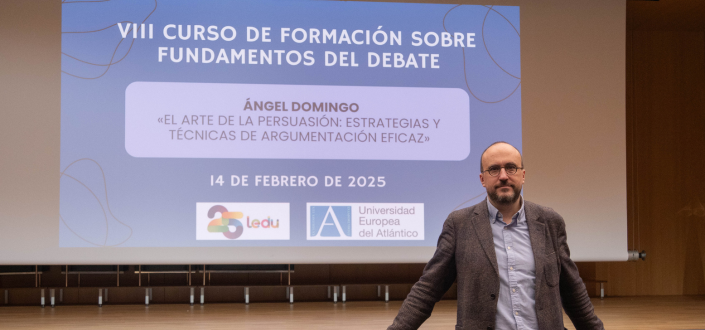The European University of the Atlantic (UNEATLANTICO) culminated its public speaking course with two lectures by Ángel Domingo, Technical and Communication Director of the Spanish University Debate League (LEDU). In these sessions, Domingo addressed key issues such as non-verbal language and effective argumentation strategies.
In the first presentation, the importance of non-verbal language in communication was highlighted. Domingo explained that what we transmit goes beyond words, highlighting that gestures, postures and expressions play a crucial role. Following Peter Drucker’s premise, ‘The most important thing in communication is to listen to what is not said’, he emphasised the need to correctly interpret the gestures and body signals of the interlocutors. He stated that ‘our body communicates more than our mouth’, and underlined how gestures can contradict what is said verbally, generating mistrust in the receiver.
Non-verbal language, according to Domingo, has an innate part, inherited through evolution, and another learned through culture. He cited studies by Darwin and Paul Ekman on basic emotions and how primary reactions to these emotions are universal, although context influences their interpretation. He also explained how the brain detects inconsistencies between what we say and how we express it. To achieve coherence between verbal and non-verbal language, Domingo suggested maintaining eye contact with the audience, avoiding reliance on paper in presentations and adopting a firm posture. He also recommended controlling breathing to project confidence.
Dr. Albert Mehrabian was quoted by the speaker to reinforce the idea that 55% of communication is based on body language, 38% on voice and only 7% on verbal content. Domingo highlighted the importance of proxemics, the proper use of space on stage, and explained how different types of gestures and their function in communication affect interaction.
The second presentation, entitled ‘The art of persuasion: strategies and techniques of effective argumentation’, reflected on the importance of effective communication in debate. Domingo recalled the importance of the thought of Karl Popper, who stated that arguments should be confronted, not people. This principle, fundamental to debate, underlines that the purpose of persuasive discourse is the confrontation of ideas, not personal attack.
Domingo also explored the origins of rhetoric, going back to 5th century BC in Syracuse, when discourse was used to resolve disputes rather than violence. Rhetoric, he stressed, has been key to democratic development ever since, with figures such as Cicero and Quintilian. He also recalled the creation of the University Debate League in 2000, reaffirming the desire of citizens to express themselves freely.
Regarding persuasion, the LEDU Technical and Communication Director explained the three Aristotelian ways: ethos (credibility of the speaker), pathos (appeal to emotion) and logos (use of reason). He also stressed the importance of decorum, or appropriateness of speech, and broke down the five phases of a persuasive speech: Inventio, Dispositio, Elocutio, Memoratio and Pronuntiatio/actio.
Finally, Domingo concluded by emphasising the importance of the structure of a good argument (ARE: Assertion, Reasoning and Evidence) and stressed that rhetoric is not a set of tricks, but a systematic discipline. As Aristotle quoted, ‘Rhetoric is a systematic discipline and not a collection of tricks’.


